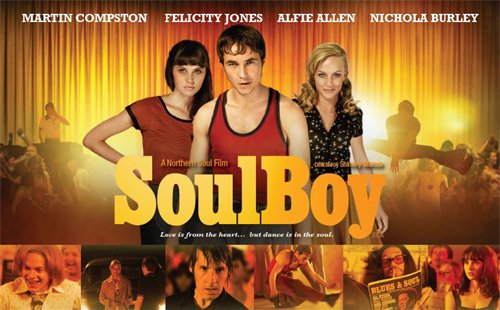
GFS home movies: SoulBoy

I don’t think it’s possible for me to watch a coming-of-age dance movie like SoulBoy without tracing some threads back to the godfather of them all – Saturday Night Fever. The key story elements are all there. Working-class boy meets a girl seemingly beyond reach, and sets about to win her through the power of dance. He is oblivious to the adoration of a more down-to-earth girl. Along the way he grows up a little, comes to resent his clownish friends, and it all ends with a climactic dance-off for all the glory.
The two leading men – Martin Compston‘s Joe McCain and John Travolta‘s Tony Manero – seem to be cut from the same cloth. They’re both working class stiffs (Joe is a delivery boy, Tony is a paint store lackey), they both find purpose in dancing, and they both eventually come to realize how little meaning that dancing really provides when doused with a cold shower of reality. That’s where the similarities end.
Joe is misguided but affable. While he can hurt those around him, he never does so intentionally (well, a little petty thievery aside). The worst you could say about Joe is that he’s a bit clueless. Tony is selfish and often cruel. He discards friends and mistreats admirers with a shocking callousness.
But at least for a little while, the only important difference is their dancing. Whereas Tony looks like he’s been dancing since he could stand, Joe is comical in his attempts to graduate from the clumsy Top of the Pops steps of the local watering hole – the Purple Onion – to the smooth moves of the legendary Wigan Casino, one of the holy temples of Northern Soul. After an embarrassing first night on the floor, Joe buckles down and gives himself a crash course in soul dancing. He does it all for the attention of a blond siren named Jane Rogers (Nichola Burley), even as the obviously more worthy Mandy Hodgson (Felicity Jones) tries to catch his eye.
You can probably figure out the rest from here. It’s a quaint love story and I’m always a sucker for period pieces, but SoulBoy is rather predictable. Despite a handful of good performances the story is as flat and unassuming as the cinematography (which incorporates the obligatory slightly grainy and washed out look of many period films). And this is what really separates the two films – atmosphere and ambition.
Saturday Night Fever, released in 1977 at the height of the disco craze, used Tony as a vehicle to gaze at the unseemly underbelly of lost youth. It was as much a social statement as a time capsule, and a damn dark one at that. SoulBoy is decidedly more lighthearted and sympathetic, owing in part to being released nearly 30 years after the height of England’s Northern Soul craze (the film takes place during 1974 in Stoke-on-Trent). While a handful of scenes involving crime, domestic violence, and drug use serve to ground the proceedings the film is at heart an exercise in retro fun.
Thus the real drawing power of SoulBoy is its soundtrack. The film is drenched in the classic soul stylings of artists like Dobie Gray, Gloria Jones, and Yvonne Baker and is every bit as fun as Saturday Night Fever‘s disco excess. For that reason alone it’s worth watching at least once.
Related articles
- You: The heart and soul of Stoke-on-Trent (guardian.co.uk)
- Nichola Burley dancing her way to stardom (thestar.com)
- Great Northern Soul Clubs (musicouch.com)
